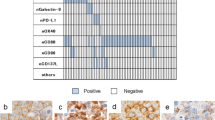Abstract
In human cancer, RCAS1 (the receptor-binding cancer antigen expressed on SiSo cells) on the surface of various kinds of tumor cells reportedly induces the apoptosis of T-cells and natural killer cells, resulting in evasion of the immune system. In the present study, an immunohistochemical analysis of RCAS1 expression was performed with lymph node specimens obtained from patients with adult T-cell leukemia/lymphoma (ATLL). Positive staining was seen in 15 (75%) of 20 cases and in all cases of patients with short survival times. In the cases of B-cell lymphomas, positive staining was seen in only 1 (13%) of 8 cases. These findings indicate that expression of RCAS1 may be associated with the evasion from immune surveillance of cells infected with human T-lymphotropic virus type I, resulting in the development of overt leukemia/lymphoma. Determination of RCAS1 expression may be useful for predicting the prognosis of patients with ATLL.
Similar content being viewed by others
References
Yamada Y, Tomonaga M. The current status of therapy for adult T-cell leukaemia-lymphoma in Japan.Leuk Lymphoma. 2003;44: 611–618.
Nakashima M, Sonoda K, Watanabe T. Inhibition of cell growth and induction of apoptotic cell death by the human tumor-associated antigen RCAS1.Nat Med. 1999;5:938–942.
Sonoda K, Nakashima M, Saito T, et al. Establishment of a new human uterine cervical adenocarcinoma cell line SiSo, and its reactivity to anti-cancer reagents.Int J Oncol. 1995;6:1099–1104.
Sonoda K, Nakashima M, Kaku T, Kamura T, Nakano H, Watanabe T. A novel tumor-associated antigen expressed in human uterine and ovarian carcinomas.Cancer. 1996;77:1501–1509.
Sonoda K, KakuT, Kamura T, Nakashima M, Watanabe T, Nakano H. Tumor-associated antigen 22-1-1 expression in the uterine cervical squamous neoplasia.Clin Cancer Res. 1998;4:1517–1520.
Usuku K, Sonoda S, Osame M, et al. HLA haplotype-linked high immune responsiveness against HTLV-I in HTLV-I-associated myelopathy: comparison with adult T-cell leukemia/lymphoma.Ann Neurol. 1988;23(suppl):S143-S150.
Yashiki S, Fujiyoshi T, Arima N, et al. HLA-A*26, HLA-B*4002, HLA-B*4006, and HLA-B*4801 alleles predispose to adult T cell leukemia: the limited recognition of HTLV type 1 Tax peptide anchor motifs and epitopes to generate anti-HTLV type 1 Tax CD8+ cytotoxic T lymphocytes.AIDS Res Hum Retroviruses. 2001; 20:1047–1061.
Strand S, Hofmann WJ, Hug H, et al. Lymphocyte apoptosis induced by CD95 (APO-1/Fas) ligand-expressing tumor cells: a mechanism of immune evasion?Nat Med. 1996;2:1361–1366.
Kaku T, Sonoda K, Kamura T, et al. The prognostic significance of tumor-associated antigen 22-1-1 expression in adenocarcinoma of the uterine cervix.Clin Cancer Res. 1999;5:1449–1453.
Arima N, Tei C. HTLV-I Tax related dysfunction of cell cycle regulators and oncogenesis of adult T cell leukemia.Leuk Lymphoma. 2001;40:267–278.
Kanavaros T, Bai M, Stefanaki K, et al. Immunohistochemical expression of the p53, mdm2, p21/Waf-1, Rb, p16, Ki67, cyclin D1, cyclin A and cyclin B1 proteins and apoptotic index in T-cell lymphomas.Histol Histopathol. 2001;16:377–386.
Oshima K, Haraoka S, Sugihara M, et al. Amplification and expression of a decoy receptor for Fas ligand (DcR3) in virus (EBV or HTLV-I) associated lymphomas.Cancer Lett. 2000;160:89–97.
Oshima K, Muta K, Nakashima N, et al. Expression of human tumor-associated antigen RCAS1 in Reed-Sternberg cells in association with Epstein-Barr virus infection: a potential mechanism of immune evasion.Int J Cancer. 2001;93:91–96.
Abe Y, Yashiki S, Choi I, et al. Eradication of virus-infected T-cells in a case of adult T-cell leukemia/lymphoma by nonmyeloablative peripheral blood stem cell transplantation with conditioning consisting of low-dose total body irradiation and pentostatin.Int J Hematol. 2002;76:91–93.
Utsunomiya A, Miyazaki Y, Takatsuki Y, et al. Improved outcome of adult T cell leukemia/lymphoma with allogeneic hematopoietic stem cell transplantation.Bone Marrow Transplant. 2001;27:15–20.
Author information
Authors and Affiliations
Corresponding author
About this article
Cite this article
Muta, K., Ohshima, K., Abe, Y. et al. Expression of Human Tumor-Associated Antigen RCAS1 in Adult T-Cell Leukemia/Lymphoma. Int J Hematol 79, 340–344 (2004). https://doi.org/10.1532/IJH97.03109
Received:
Revised:
Accepted:
Published:
Issue Date:
DOI: https://doi.org/10.1532/IJH97.03109




